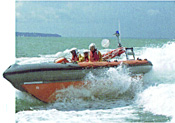The Hibbert Assembly
FOR
THOSE IN PERIL IN THE SEA
Topics for discussion |
 |
| 1. What is the value of
doing voluntary work? Who benefits from it? |
| 2. Should people risk their lives to
rescue others? If so, should everybody do this? |
| 3. What sort of qualities would you
expect to find in a person who volunteered to serve in a lifeboat? |
| 4. Should the lifeboat service be run as
a charity - as it is now - dependent on voluntary donations, or should
it be provided by the state, out of taxation, and with salaried crews?
(The RNLI justify the principles on which it is based on the grounds
that it can remain independent of political pressure and government
spending cuts. It argues that a service staffed by volunteers is likely
to be more efficient since its crews are especially capable and have a
particular local knowledge.) |
| 5. The RNLI makes no charge for its
rescues. But should people be expected to pay for the vital help it has
given them? (RNLI argues that if people knew they would have to pay,
they might be very unwilling to put out distress signals and might then
increase their danger. If the situation worsened as they delayed,
lifeboat crews would also be put in graver danger.) |
| 6. Are there aspects of modern-day life
where a new voluntary service might be welcomed? |
|
|
 |
|
|
|
 |
 Return
to the Hibbert Assembly Main Index Return
to the Hibbert Assembly Main Index
 Return
to Those in peril on the sea index Return
to Those in peril on the sea index |
![]()
![]()